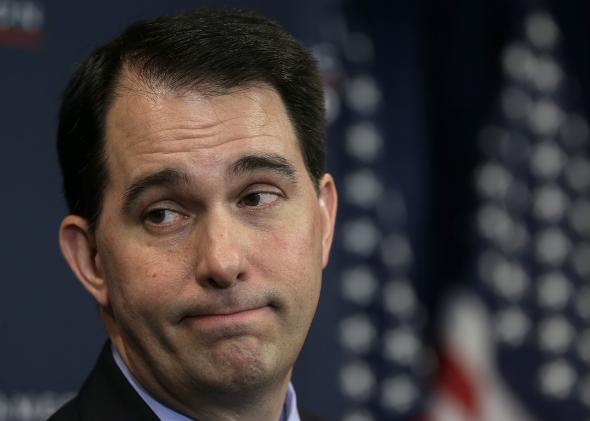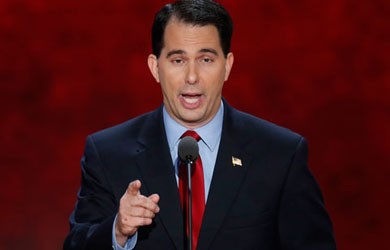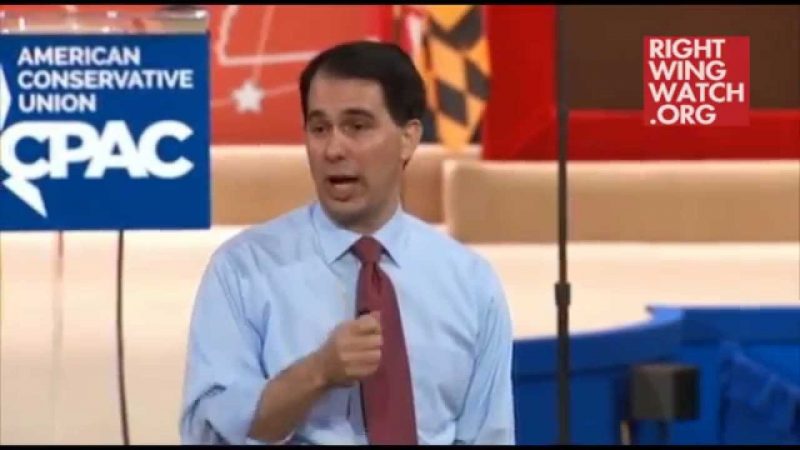As the GOP embraces the reactionary politics and anti-government zealotry of the Tea Party, it is steadily purging “moderates” and empowering extremists. Nothing shows this trend more clearly than the lineup of potential Republican presidential candidates. In this new series, we’ll be looking at the records and promises of the Republican Party’s leading presidential prospects. Next up is Scott Walker:
Wisconsin Gov. Scott Walker became a right-wing hero in 2011 when he pushed a package of union-busting labor reform laws through the state legislature as protesters occupied capitol building, and then survived a subsequent recall election.
Walker — who portrays himself as an “unintimidated” leader — has attempted to turn Wisconsin into a petri dish for conservative orthodoxy, spearheading efforts to curb the rights of workers, implement austerity economics, defund and privatize education, undermine campaign finance laws, restrict voting rights and crack down on legal abortion.
After the corporate tax cuts he championed caused his state’s budget deficit to balloon, Walker argued that Wisconsin needed to curtail the collective bargaining rights of public employees in order to close the deficit. His proposal targeted unions that typically supported Democrats, while GOP-aligned unions were conveniently left unaffected.
Tea Party groups rallied to Walker’s defense as protests rocked Madison, and Koch-funded groups including Americans for Prosperity and the Wisconsin Club for Growth — the organization at the center of a scandal involving illegal coordination between Walker’s office and outside political groups — poured in millions of dollars to defend Walker and promote his policies.
Walker’s recipe for economic prosperity in Wisconsin, which he wants to replicate nationwide, hasn’t exactly been a success, as the state lags in job growth compared to its neighbors, and Walker badly missed his goal of creating 250,000 jobs by the end of his first term.
Walker coupled his offensive against workers with attacks on families who rely on public health insurance, costing the state hundreds of millions of dollars in federal Medicaid subsides. He also drove through new laws curbing early voting and making it harder for the hundreds of thousands of Wisconsin residents without drivers licenses to vote, a move that disproportionately affected people of color and young people [PDF].
But most recently, Walker has been receiving attention for his clear policy shifts as he prepares to run for president. He signed so-called “right-to-work” legislation crippling private-sector unions, a bill he repeatedly said he wouldn’t touch as governor; reversed his position on whether undocumented immigrants should have a pathway to citizenship, saying that despite past statements he is now opposed to such a plan; he endorsed a federal ethanol mandate, popular among Iowans, that he previously criticized for interfering in free markets and opposed as far back as 1999; and he pledged to sign into law a 20-week abortion ban, although he had vowed in a campaign ad to leave the “final decision” on terminating a pregnancy “a woman and her doctor.”
After pivoting to the center to win a tight race for re-election, Walker now seems comfortable embracing his previous right-wing stances as he explores a campaign for the GOP presidential nomination. Despite his campaign claims that he doesn’t have a position on marriage equality and will not “focus on” or “obsess with” abortion rights, Walker actually has a long record of Religious Right-aligned political activism.
Walker used his position as governor to fulfill a right-wing wish list, successfully repealing a law that allowed women to challenge discriminatory payment practices in state court; blocking the defense of a state law granting hospital visitation rights to same-sex partners; enacting targeted regulation of abortion providers (TRAP) laws aimed at closing clinics and limiting coverage; requiring women who seek an abortion to undergo an ultrasound; restricting birth control access; ending the state’s relationship with Planned Parenthood; and weakening comprehensive sex education in favor of abstinence-only lessons.
One Wisconsin Republican state senator criticized Walker’s policies as “way too extreme,” arguing that they serve “an out of state billionaire funded and driven agenda.” One of Walker’s own fundraising officials emphasized the need for the governor to solicit money from the Koch brothers and billionaire GOP donor Sheldon Adelson, writing, “Corporations. Go heavy after them to give.” Walker staff members are currently facing a legal probe involving claims that they illegally coordinated with outside political groups while working for the governor’s recall campaign.
With such experience, it is no wonder that Walker cited his standoff with pro-labor demonstrators as a reason that he would be effective in fighting terrorists.







